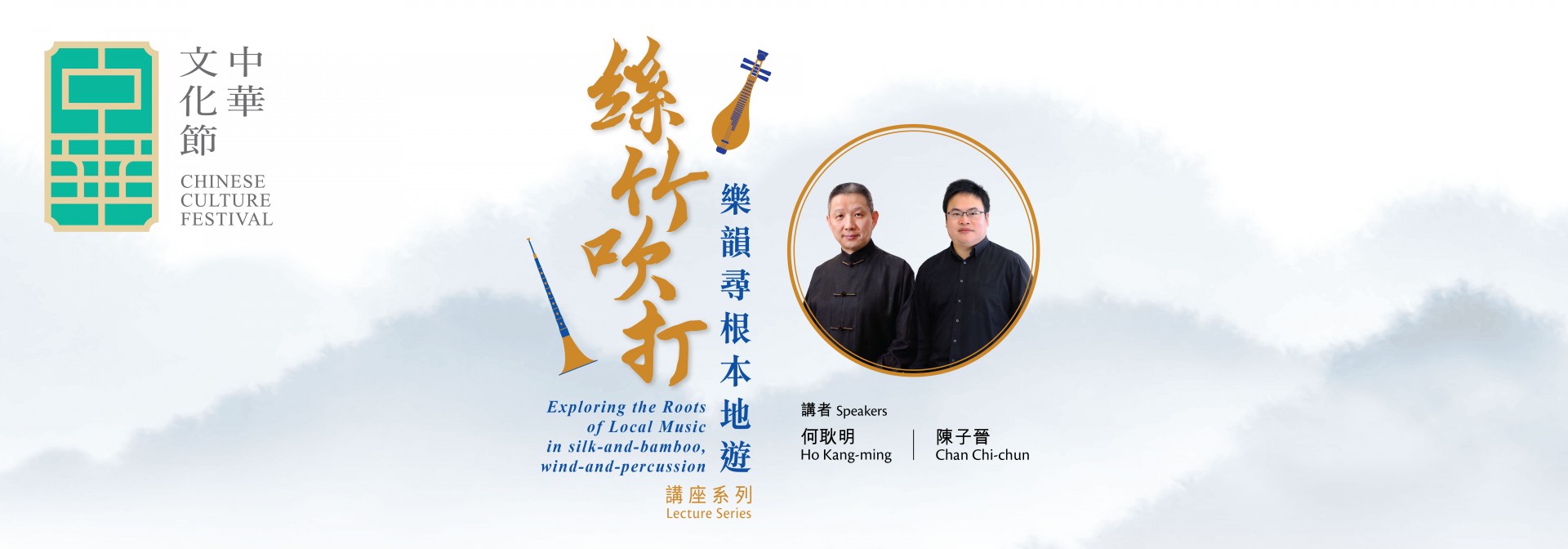
Chinese Culture Festival 2024: "Exploring the Roots of Local Music in silk-and-bamboo, wind-and-percussion" Lecture Series
Sizhu means ‘silk and bamboo’, or by extension, ‘strings and winds’ in Chinese. It is a term frequently used in ancient Chinese poetry and prose to refer to music, describing a sophisticated way to gather like-minded friends for leisurely self-entertainment and expression of emotions. Verses from a poem Shui Diao Ge Tou (Water Song) by the Song Dynasty poet, Su Dongpo (1037 - 1101), say, 'Parting with middle-aged friends and relatives is hard, but sizhu eases the sorrow.' Furthermore, sizhu was often used to accompany singing and dancing to entertain guests, as seen in another Song poem, Yu Mei Ren by Wang Anshi (1021 – 1086), 'Sizhu accentuates the slow song and dance.' Throughout history, sizhu music has played a significant role in entertaining the general public and creating harmonious societies.
Chuida means ‘wind and percussion’. It originated from ancient military music and has been used in customary folk celebrations, festivals, weddings, and funerals. Their significance in traditional ceremonies has long been established.
Sizhu is associated with the civil category of music, and chuida, the militaristic. Sizhu is of equal importance with chuida. Musical instruments of both categories have been employed on the traditional theatre stage for a long time.
As traditional Chinese music forms, 'silk-and-bamboo' represents the sentimental music expression while 'wind-and-percussion' represents the strong and celebrative expression in the Chinese instrumental music tradition. Hong Kong has always been considered a melting pot of talents from China’s north and south. During the pre-war era, Cantonese Opera virtuosi and music maestros from Guangdong based themselves in Hong Kong and made their living composing tunes, cutting records and publishing music scores. After the war, a large number of well-known musicians relocated to Hong Kong. They became a thriving work force in scoring for films, composition of songs and teaching, thus enriching the local sizhu soundscape. These sounds have endured over the years and formed the foundation for the subsequent popularization of Chinese music. Its longstanding tolerance for both new and old, and its liberal attitude are precisely the qualities that underly the unique attraction of Hong Kong.
This programme is honoured to have the support of many veteran speakers from different sectors to share their insights on the origin, dissemination and development of traditional Chinese music in Hong Kong.
Speakers: Ho Kang-ming, Chan Chi-chun
5 Jun 2024 (Wed)
Lecture 1: Pipa Master Lui Pui-yuen and his Profound Influence
Guest Speaker: Fung Tung
Renowned pipa maestro Lui Pui-yuen moved to Hong Kong in the 1950s. He was actively involved in composing film scores, producing records and teaching pipa. He is therefore the teacher of many musicians. He was among the first generation of musicians who introduced Chinese sizhu music to Hong Kong. In the 1970s, Lui migrated to the United States, where he continues to promote Chinese traditional music, and his students are all over the globe. Fung Tung will reminisce about the days when he trained under the Maestro, and shares his fondness for pipa music.
19 Jun 2024 (Wed)
Lecture 2: Huqin Playing of North and South
Guest Speaker: Koo Sing-Fai
Huqin maestro Tong Leung-tak settled in Hong Kong in the 1970s and devoted himself to Chinese music education and establishment in the territory. His efforts benefited many. Huqin performer Koo Sing-fai, student of the late Maestro will recall how his teacher taught him in his teenage years about the art of the huqin, and will share his personal experience of acquiring the huqin playing techniques of both North and South.
26 Jun 2024 (Wed)
Lecture 3: Kunqu Singing and Bamboo Flute Accompaniment
Guest Speakers: Sou Si-tai, Cheung Lai-chun
There is an ancient Chinese saying that ‘silk cannot compare with bamboo, and bamboo is not as good as flesh’ – ‘flesh’ here refers to the singing voice of humans. Kunqu has a long history, and its exquisite tones and delicate tunes were deeply admired by the literati of ancient China. Dizi is the main instrument accompanying the singing in Kunqu; so, like the splendid peony and its lustrous leaves, the two complement each other. It is a rare occasion to have both Sou Si-tai and Cheung Lai-chun together to explain the intricate singing and dizi accompaniment details based on the notations on the Sulu Score. Appreciating the elegance of Kunqu and sizhu with these two experts is an opportunity not to be missed.
3 Jul 2024 (Wed)
Lecture 4: Recording Industry of Chinese Music in Hong Kong
Guest Speakers: Cheng Wai-tao, Kong Kwok-ping
In the past, music was primarily disseminated through records. The guest speakers for this lecture are Cheng Wai-tao and Kong Kwok-ping from the Hong Kong music recording industry. They will share their experiences and aspirations in joining the industry, the historical crests and troughs for the distribution of Chinese music records Hong Kong, and the impact records have on local and Chinese culture.
17 Jul 2024 (Wed)
Lecture 5: Music Heritage Lies in the Family (Cancelled)
Guest Speaker: Ko Yun-hung
Nowadays, it is rather uncommon to have music practitioners who are inheritors of ancestral musical artistry. Ko Yun-hung, a fourth-generation of a musical family in Hong Kong will be guest speaker for the lecture. Proficient in Cantonese Opera live accompaniment as well as sizhu and chuida, Ko is well-versed in both the civil and martial aspects of Cantonese Opera music. He will be sharing his experience in learning Cantonese Opera and Taoist Zhengyi music, and evaluating the importance of one-on-one, hands-on teaching when passing down the tradition.
24 Jul 2024 (Wed)
Lecture 6: Wind-and-percussion music of Chaozhou
Guest Speakers: Lau Fok-kwong, Frederick Lau
The celebrated ‘silk-and-bamboo’ and gongs-and-drums music of Chaozhou have been around for a long time. Lau Fok-kwong and Frederick Lau will introduce to the audience the music lineup and its meaning at traditional festivals of Chaozhou community of Hong Kong.
(Information provided by the speakers.)
Conducted in Cantonese
Each lecture will run for about 1 hour and 30 minutes.
Free Seating
The programme does not represent the views of the Leisure and Cultural Services Department.
The presenter reserves the right to change the programmes and substitute the speakers.
